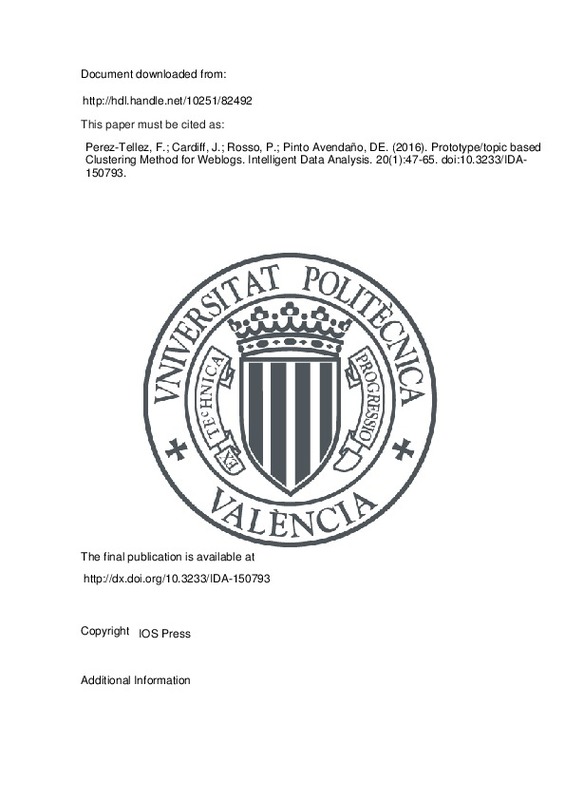JavaScript is disabled for your browser. Some features of this site may not work without it.
Buscar en RiuNet
Listar
Mi cuenta
Estadísticas
Ayuda RiuNet
Admin. UPV
Prototype/topic based Clustering Method for Weblogs
Mostrar el registro sencillo del ítem
Ficheros en el ítem
| dc.contributor.author | Perez-Tellez, Fernando
|
es_ES |
| dc.contributor.author | Cardiff, John
|
es_ES |
| dc.contributor.author | Rosso, Paolo
|
es_ES |
| dc.contributor.author | Pinto Avendaño, David Eduardo
|
es_ES |
| dc.date.accessioned | 2017-06-07T08:13:30Z | |
| dc.date.available | 2017-06-07T08:13:30Z | |
| dc.date.issued | 2016 | |
| dc.identifier.issn | 1088-467X | |
| dc.identifier.uri | http://hdl.handle.net/10251/82492 | |
| dc.description.abstract | [EN] In the last 10 years, the information generated on weblog sites has increased exponentially, resulting in a clear need for intelligent approaches to analyse and organise this massive amount of information. In this work, we present a methodology to cluster weblog posts according to the topics discussed therein, which we derive by text analysis. We have called the methodology Prototype/Topic Based Clustering, an approach which is based on a generative probabilistic model in conjunction with a Self-Term Expansion methodology. The usage of the Self-Term Expansion methodology is to improve the representation of the data and the generative probabilistic model is employed to identify relevant topics discussed in the weblogs. We have modified the generative probabilistic model in order to exploit predefined initialisations of the model and have performed our experiments in narrow and wide domain subsets. The results of our approach have demonstrated a considerable improvement over the pre-defined baseline and alternative state of the art approaches, achieving an improvement of up to 20% in many cases. The experiments were performed on both narrow and wide domain datasets, with the latter showing better improvement. However in both cases, our results outperformed the baseline and state of the art algorithms. | es_ES |
| dc.description.sponsorship | The work of the third author was carried out in the framework of the WIQ-EI IRSES project (Grant No. 269180) within the FP7 Marie Curie, the DIANA APPLICATIONS Finding Hidden Knowledge in Texts: Applications (TIN2012-38603-C02-01) project and the VLC/CAMPUS Microcluster on Multimodal Interaction in Intelligent Systems. | en_EN |
| dc.language | Inglés | es_ES |
| dc.publisher | IOS Press | es_ES |
| dc.relation.ispartof | Intelligent Data Analysis | es_ES |
| dc.rights | Reserva de todos los derechos | es_ES |
| dc.subject | Short text analysis | es_ES |
| dc.subject | Weblog clustering | es_ES |
| dc.subject | Topic Identification | es_ES |
| dc.subject.classification | LENGUAJES Y SISTEMAS INFORMATICOS | es_ES |
| dc.title | Prototype/topic based Clustering Method for Weblogs | es_ES |
| dc.type | Artículo | es_ES |
| dc.identifier.doi | 10.3233/IDA-150793 | |
| dc.relation.projectID | info:eu-repo/grantAgreement/EC/FP7/269180/EU/Web Information Quality Evaluation Initiative/ | es_ES |
| dc.relation.projectID | info:eu-repo/grantAgreement/MINECO//TIN2012-38603-C02-01/ES/DIANA-APPLICATIONS: FINDING HIDDEN KNOWLEDGE IN TEXTS: APPLICATIONS/ | es_ES |
| dc.rights.accessRights | Abierto | es_ES |
| dc.contributor.affiliation | Universitat Politècnica de València. Escola Tècnica Superior d'Enginyeria Informàtica | es_ES |
| dc.description.bibliographicCitation | Perez-Tellez, F.; Cardiff, J.; Rosso, P.; Pinto Avendaño, DE. (2016). Prototype/topic based Clustering Method for Weblogs. Intelligent Data Analysis. 20(1):47-65. https://doi.org/10.3233/IDA-150793 | es_ES |
| dc.description.accrualMethod | S | es_ES |
| dc.relation.publisherversion | http://dx.doi.org/10.3233/IDA-150793 | es_ES |
| dc.description.upvformatpinicio | 47 | es_ES |
| dc.description.upvformatpfin | 65 | es_ES |
| dc.type.version | info:eu-repo/semantics/publishedVersion | es_ES |
| dc.description.volume | 20 | es_ES |
| dc.description.issue | 1 | es_ES |
| dc.relation.senia | 326674 | es_ES |
| dc.contributor.funder | European Commission | |
| dc.contributor.funder | Ministerio de Economía y Competitividad | es_ES |







![[Cerrado]](/themes/UPV/images/candado.png)

